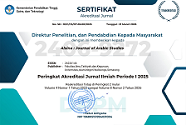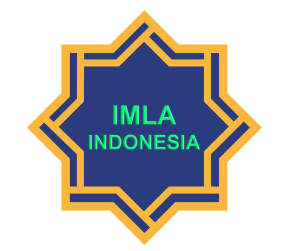Interferensi Bahasa dan Upaya Intervensinya dalam Pengajaran Mahārah Kitābah
DOI:
https://doi.org/10.21580/alsina.7.2.29203Keywords:
Arabic Writing, Cultural-Historical Activity Theory, Interlanguage, Language Interference, Pedagogical InterventionAbstract
This study aims to analyze the dynamics of interference and intervention in Arabic writing learning within an Islamic boarding school context. Conducted longitudinally over three years with 24 students at Al-Izzah Integrated Islamic Boarding School (IIBS) in Batu City, this research employed a descriptive qualitative approach under the frameworks of Cultural-Historical Activity Theory (CHAT) and Zone of Proximal Development (ZPD). Data were collected through classroom observations, students’ writing analysis, and in-depth interviews with Arabic teachers. The findings reveal that linguistic interference is not merely a structural error but rather a manifestation of the developmental nature of learners’ interlanguage systems. Pedagogical interventions such as authentic writing tasks, cultural scaffolding, and reflective mentoring were proven effective in reducing syntactic, semantic, and orthographic interference. The study highlights that language learning is a dialectical interaction among linguistic, psychological, and cultural factors. Theoretically, this research reinforces the Dynamic Theory of Interference–Intervention (DTII) as a comprehensive framework for foreign language education, while practically emphasizing the importance of developmental and metalinguistic awareness-based instructional strategies.
Downloads
References
Al-Amin, Ahmad Amiq, and Afif Kholisun Nashoih. “Indonesian Grammatical Interference in Daily Arabic Conversation by the Students of the Al-Munawwarah Islamic Boarding School, Jombang.” ALLAIS Journal of Arabic Language and Literature 1, no. 2 (2022): 20–38. https://doi.org/10.22515/allais.v1i2.5662.
Al-Khresheh, Mohammad Hamad. “A Review Study of Interlanguage Theory.” International Journal of Applied Linguistics and English Literature 4, no. 3 (2015): 123–31. https://doi.org/10.7575/aiac.ijalel.v.4n.3p.123.
Al-Mutairi, Eidah. “The Impact of the Affective Filter in the Acquisition of English Among College Students in Kuwait.” The Asian Conference on Education 2024: Official Conference Proceedings, 2025, 1095–1106. https://doi.org/10.22492/issn.2186-5892.2025.95.
Alkhateeb, Abdulelah. “Dynamic Transfer and Relations between First Language (L1) Proficiency and Second Language (L2) Writing Skills Performance.” Arab World English Journal 9, no. 4 (2018): 324–36. https://doi.org/10.24093/awej/vol9no4.24.
Almutairy, Amal Hassan. “Exploring The Relationship between Self-Efficacy and Second Language Writing Anxiety Among Saudi EFL Students: A Correlational Study.” Arab World English Journal, 2024, 1–48. https://doi.org/10.24093/awej/th.311.
Amalia, Dian Risky et al. “Interferensi Bahasa Indonesia ke dalam Bahasa Arab di Pondok Roudlatul Qur’an Metro Lampung.” Attractive : Innovative Education Journal 1, no. 1 (2019): 80–110. https://doi.org/10.51278/aj.v1i1.6.
Andriani, Erina et al. “A Cultural-Historical Activity Theory (CHAT) Analysis on Educational Psychology Class: The Challenges in Delivering a Fully Online Classroom Environment.” Journal of Foreign Language Teaching and Learning 7, no. 1 (2022): 41–60. https://doi.org/10.18196/ftl.v7i1.13196.
Annisa, Maryam Nur et al. “Pemerolehan Bahasa Arab sebagai Bahasa Kedua (Kajian Psikolinguistik).” `A Jamiy : Jurnal Bahasa dan Sastra Arab 12, no. 2 (2023): 468–84. https://doi.org/10.31314/ajamiy.12.2.468-484.2023.
Aprilia, Sarah et al. “The Using of Think, Talk, Write (TTW) Strategy to Improve Students’ Writing Skill.” Bilingual : Jurnal Pendidikan Bahasa Inggris 6, no. 2 (2024): 148–53. https://doi.org/10.36985/8dv8mz98.
Asmilia, Dera et al. “Lexical and Cultural Nuances in Arabic–Indonesian Translation: Strategies for Novice Translators.” Aphorisme: Journal of Arabic Language, Literature, and Education 6, no. 1 (2025): 426–44. https://doi.org/10.37680/aphorisme.v6i1.7596.
Chamorro, Gloria, and Vikki Janke. “Educational Bilingualism: Reflections on a Longitudinal Study of Children’s Cognitive and Linguistic Development.” Ampersand 10, no. 1 (2023): 100115. https://doi.org/10.1016/j.amper.2023.100115.
Cong-Lem, Ngo. “Vygotsky’s, Leontiev’s and Engeström’s Cultural-Historical (Activity) Theories: Overview, Clarifications and Implications.” Integrative Psychological and Behavioral Science 56, no. 4 (2022): 1091–1112. https://doi.org/10.1007/s12124-022-09703-6.
Dmitrieva, Olga et al. “The Effect of Instructed Second Language Learning on the Acoustic Properties of First Language Speech.” Languages 5, no. 4 (2020): 44. https://doi.org/10.3390/languages5040044.
Engeström, Yrjö. “Expansive Learning at Work: Toward an Activity Theoretical Reconceptualization.” Journal of Education and Work 14, no. 1 (2001): 133–56. https://doi.org/10.1080/13639080020028747.
Ghozali, M. Dzikrul Hakim Al, and Ima Ni’matus Sholikhah. “Pengembangan Model Pembelajaran Maharah Al-Kalam Berbasis Teori Konstruktivisme dalam Meningkatkan Kualitas Pembelajaran Bahasa Arab di Madrasah Aliyah.” At-Tuhfah : Jurnal Studi Keislaman 10, no. 1 (2021): 60–75. https://doi.org/10.32665/attuhfah.v10i1.651.
Hasyim, Mohamad Yusuf Ahmad. “The Role of Negative Transfer in the Arabic Language Acquisition of Indonesian Learners.” In Proceedings of the International Joint Conference on Arts and Humanities 2024 (IJCAH 2024), 1102–12. Atlantis Press, 2025. https://doi.org/10.2991/978-2-38476-317-7_107.
Heritage, Moleke, and Malesela Edward Montle. “Examining the Influence of the First Language on Teaching and Learning English as a Second Language (L2): A Linguistic Interference Perspective.” International Journal of Language and Literary Studies 4, no. 4 (2022): 289–99. https://doi.org/10.36892/ijlls.v4i4.1092.
Hidayat, Nandang Sarip. “Analisis Kesalahan dan Konstrastif dalam Pembelajaran Bahasa Arab.” Kutubkhanah: Jurnal Penelitian Sosial Keagamaan 17, no. 2 (2014): 160–74. https://doi.org/10.24014/kutubkhanah.v17i2.815.
Hindun, Hindun, and Humaidi Humaidi. “Interferensi Bahasa Daerah dalam Pembelajaran Bahasa Arab: Analisis Dampak pada Struktur Sintaksis dan Pemahaman Semantik.” Qismul Arab: Journal of Arabic Education 3, no. 2 (2024): 106–12. https://doi.org/10.62730/qismularab.v3i02.94.
Hopp, Holger et al. “Syntactic Development in Early Foreign Language Learning: Effects of L1 Transfer, Input, and Individual Factors.” Applied Psycholinguistics 40, no. 5 (2019): 1241–67. https://doi.org/10.1017/S0142716419000249.
Hula, Ibnu Rawandhy N. et al. “Transcription of Pegon Gorontalo Arabic Orthography, Malay and Arabic Standard: A Contraceptive Linguistic Analysis.” `A Jamiy : Jurnal Bahasa Dan Sastra Arab 11, no. 2 (2022): 322–41. https://doi.org/10.31314/ajamiy.11.2.322-341.2022.
Insani, Hilda. “Strategi Efektif Untuk Meningkatkan Keterampilan Berbahasa Pada Anak Usia Dini Pemalu Melalui Pendekatan Teori Zona Perkembangan Proksimal (ZPD) Vygotsky.” Jurnal Pendidikan Anak Usia Dini 2, no. 2 (2024): 14. https://doi.org/10.47134/paud.v2i2.1272.
Insani, Nurul, and Baiq Widia Nita Kasih. “The Interference of The Indonesian Language in The Daily Arabic Conversation Among Female Students at an Islamic High School in Indonesia.” Journal of Arabic Language Learning and Teaching (JALLT) 3, no. 1 (2025): 47–58. https://doi.org/10.23971/jallt.v3i1.265.
Kafi, Fina Aunul et al. “Metacognitive Strategy for Arabic Writing among Students in Arabic Departement.” Arabiyatuna: Jurnal Bahasa Arab 8, no. 2 (2024): 779–804. https://doi.org/10.29240/jba.v8i2.10841.
Kang, Xin et al. “Language and Nonlanguage Factors in Foreign Language Learning: Evidence for the Learning Condition Hypothesis.” Npj Science of Learning 6, no. 1 (2021): 1–28. https://doi.org/10.1038/s41539-021-00104-9.
Karim, Khaled, and Hossein Nassaji. “First Language Transfer in Second Language Writing: An Examination of Current Research.” Iranian Journal of Language Teaching Research 1, no. 1 (2013): 117–34. https://ijltr.urmia.ac.ir/article_20456.html.
Lantolf, James P., and Matthew E. Poehner. Sociocultural Theory and the Pedagogical Imperative in L2 Education. New York: Routledge, 2014. https://doi.org/10.4324/9780203813850.
Miftachul Taubah et al. “Internalisasi Nilai-nilai Multikultural dalam Proses Pembelajaran Bahasa Arab di Pendidikan Tinggi.” Alsina : Journal of Arabic Studies 7, no. 1 (2025): 111–42. https://doi.org/10.21580/alsina.7.1.26544.
Mills, Albert J. et al., eds. “Longitudinal Research.” In Encyclopedia of Case Study Research. Thousand Oaks: SAGE Publications, Inc., 2010. https://doi.org/10.4135/9781412957397.n196.
Moye, Johnny J. et al. “Is ‘Learning by Doing’ Important? A Study of Doing-Based Learning.” Technology and Engineering Teacher 74, no. 3 (2014): 22–28.
Munmun, Fatematuz Zohora et al. “Tertiary EFL Learners’ Perceptions on Mother Tongue Interference (MTI) in Academic Oral Performances.” Journal of ELT and Education 7, no. 1 (2024): 8–15. https://doi.org/10.5281/zenodo.10619551.
Mustofa, Muhammad Arif. “Interferensi Bahasa Indonesia Terhadap Bahasa Arab (Analisis Interferensi dalam Pembelajaran Maharah al Kalam).” An Nabighoh: Jurnal Pendidikan dan Pembelajaran Bahasa Arab 20, no. 2 (2018): 139–61. https://doi.org/10.32332/an-nabighoh.v20i02.1275.
Nafisah, Jauharotun et al. “Semantic Mapping Strategy Dan Progres Pemahaman Qawaid Bahasa Arab Di Pondok Pesantren Mamba’ul Falah Kudus.” Al-Jawhar : Journal of Arabic Language 1, no. 1 (2023): 1–13. https://doi.org/10.69493/ajoal.v1i1.11.
Nashoih, Afif Kholisun, and M. Faridl Darmawan. “Pengembangan Bahan Ajar Nahwu Berbasis Kontrastif untuk Mengatasi Interferensi Bahasa Indonesia terhadap Bahasa Arab.” Arabiyatuna : Jurnal Bahasa Arab 3, no. 2 (2019): 335–54. https://doi.org/10.29240/jba.v3i2.1008.
Nisa, Luthfiyah Khoirun, and Abdul Mutholib. “Implementasi Pembelajaran Bahasa Arab Materi Qawāʿid Menggunakan Media Visual Wall Chart di Madrasah Aliyah.” Alsina : Journal of Arabic Studies 6, no. 2 (2024): 151–68. https://doi.org/10.21580/alsina.6.2.22325.
Nufus, Hayati et al. “Development of Tarkib Teaching Materials Based on Motion Graphic in Islamic Junior High School.” Jurnal Al Bayan: Jurnal Jurusan Pendidikan Bahasa Arab 14, no. 1 (2022): 40–57. https://doi.org/10.24042/albayan.v14i1.7145.
Razak, Nor Asia Mohamad et al. “Kerangka Konsep bagi Kejayaan Guru dalam Pengintegrasian ICT: Pendekatan Teori Sosial dan Budaya.” In Proceeding of Gradute Research in Education Seminar, 1–14. Selangor: Universiti Putra Malaysia, 2018. http://psasir.upm.edu.my/id/eprint/67752/1/GREDUC_2018-14.pdf.
Riazi, A. Mehdi, and Malihe Rezaei. “Teacher- and Peer-Scaffolding Behaviors : Effects on EFL Students ’ Writing Improvement.” In CLESOR 2010: Proceedings of the 12th National Conference for Community Languages and ESOL, 55–63. Dunedin, 2011. https://www.researchgate.net/profile/Mehdi-Riazi-2/publication/235982664_6_Riazi_Rezaii_Teacher-_and_peer-scaffolding_behaviors/links/00b7d5152e656c9ca3000000/6-Riazi-Rezaii-Teacher-and-peer-scaffolding-behaviors.pdf.
Rohman, Abdul et al. “Local Language Interference on Non-Native Arabic Speaker in Rural Santri Communities: Sociolinguistic Study.” Langkawi: Journal of The Association for Arabic and English 11, no. 1 (2025): 76–90. https://doi.org/10.31332/lkw.v11i1.11078.
Saadah, Fina. “Analisis Kesalahan Berbahasa dan Peranannya dalam Pembelajaran Bahasa Asing.” Wahana Akademika: Jurnal Studi Islam dan Sosial 14, no. 1 (2012): 1–29. https://doi.org/10.21580/wa.v14i1.351.
Sari, Winda Purnama et al. “Peran Bahasa Indonesia dalam Mewujudkan Komunikasi Inklusif di Dunia Pendidikan.” Jurnal Lentera Edukasi 3, no. 3 (2025): 113–17. https://doi.org/10.70305/jle.v3i3.128.
Selinker, Larry. “Interlanguage.” IRAL - International Review of Applied Linguistics in Language Teaching 10 (1972): 209–31. https://doi.org/10.1515/iral.1972.10.1-4.209.
Showalter, Catherine E., and Rachel Hayes-Harb. “Native English Speakers Learning Arabic: The Influence of Novel Orthographic Information on Second Language Phonological Acquisition.” Applied Psycholinguistics 36, no. 1 (2015): 23–42. https://doi.org/10.1017/S0142716414000411.
Solehudin, Muhamad, and Yusuf Arisandi. “Language Interference in Arabic Learning: A Case Study of Islamic Boarding Schools in Indonesia.” Al-Ta’rib : Jurnal Ilmiah Program Studi Pendidikan Bahasa Arab IAIN Palangka Raya 12, no. 2 (2024): 423–38. https://doi.org/10.23971/altarib.v12i2.9170.
Subarkah, Ghazy Muhyiyuddin, and Maman Lesmana. “Various Problems and Solutions in Translating Between Arabic and Indonesian.” Journal of Social Research 3, no. 11 (2024): 1–10. https://doi.org/10.55324/josr.v3i11.2303.
Syahid, Ahmad Habibi et al. “Bilingual Code Switching in Arabic Learning Among Indonesian Learners: A Sociolinguistic Perspective.” ALSUNIYAT: Jurnal Penelitian Bahasa, Sastra, Dan Budaya Arab 8, no. 1 (2025): 180–95. https://doi.org/10.17509/alsuniyat.v8i1.81259.
Ta, Na, and Abu Bakar Razali. “Concept Mapping for Improving Reading Comprehension in Second Language Education: A Systematic Review.” International Journal of Learning, Teaching and Educational Research 22, no. 8 (2023): 287–300. https://doi.org/10.26803/ijlter.22.8.16.
Vygotsky, L S. Mind in Society: The Development of Higher Psychological Processes. Harvard University Press, 1978.
Wardani, Ivo Retna Wardani et al. “Teori Belajar Perkembangan Kognitiv Lev Vygotsky dan Implikasinya dalam Pembelajaran.” DIMAR: Jurnal Pendidikan Islam 4, no. 2 (2023): 332–46. https://doi.org/10.58577/dimar.v4i2.92.
Widanta, I. Made Rai Jaya et al. “Pragmatic Errors and Transfer of Foreign Learners of Indonesian: The Case of Refusals.” Journal of Language Teaching and Research 10, no. 3 (2019): 501–8. https://doi.org/10.17507/jltr.1003.13.
Yuslizar, Fairus Afra, and Uril Bahruddin. “Tadakhul Al-Lughah Al-Indunisiyyah Fi Maharat Al-Kitabah Lada at-Talamidz Bi Ma’hadi Al-‘Izzah Al-Islamiy Al-‘Alamiy Batu.” Lisanudhad 8, no. 2 (2021): 111–32. https://doi.org/10.21111/lisanudhad.v8i2.6853.
Zaretsky, Viktor K. “One More Time on the Zone of Proximal Development.” Cultural-Historical Psychology 17, no. 2 (2021): 37–49. https://doi.org/10.17759/chp.2021170204.
Zhou, Jie et al. “Investigating High Schoolers’ L2 Writing Anxiety, L2 Writing Self-Efficacy, L2 Writing Self-Regulated Strategies, and L2 Writing Engagement: Relationships and Mediator.” Frontiers in Psychology 13 (2022): 1–9. https://doi.org/10.3389/fpsyg.2022.1012407.
Downloads
Published
How to Cite
Issue
Section
License

This work is licensed under a Creative Commons Attribution-NonCommercial-ShareAlike 4.0 International License.
Copyright
The copyright of the received article shall be assigned to the publisher of the journal. The intended copyright includes the right to publish the article in various forms (including reprints). The journal maintains the publishing rights to published articles. Authors are allowed to use their articles for any legal purposes deemed necessary without written permission from the journal, but with an acknowledgment to this journal of initial publication.
Licensing
In order for Alsina: Journal of Arabic Studies to publish and distribute research articles, the editors need publishing rights (transferred from author to publisher). This agreement relates to the transfer/publishing copyright license to Alsina: Journal of Arabic Studies but the authors still have significant rights to use and share their published articles.
Alsina: Journal of Arabic Studies supports the need for writers to share, disseminate and maximize the impact of their research and their rights on any database. As a journal article writer, you have the right to various uses of your articles, including that by the institution or company where you work. Copyright can be used without the need for special permission. Authors who publish articles in the Alsina: Journal of Arabic Studies have broad rights to use their work for teaching and scientific purposes without requesting permission, including:
- Use by the author for lectures, presentations, or conferences, with distribution of copies to participants;
- Distribution to colleagues for research use;
- Use in compilations of the author's subsequent work;
- inclusion in a thesis or dissertation;
- Reuse of sections or excerpts from articles in other works (with full acknowledgment of the final article);
- Preparation of derivative works (other than commercial purposes) (with full acknowledgment of the final article);
- Voluntary posting on open websites operated by authors’ or writers' agencies for scientific purposes
When submitting a manuscript, authors do so on the understanding that if accepted for publication, the copyright for publishing (publishing right) of the article shall be assigned/transferred to Alsina: Journal of Arabic Studies.
Authors whose articles are accepted for publication will receive confirmation via email and sent a Copyright Transfer Agreement.

 Accreditation
Accreditation 
 In Collaboration with
In Collaboration with 

 Visitors
Visitors  Article Template
Article Template





